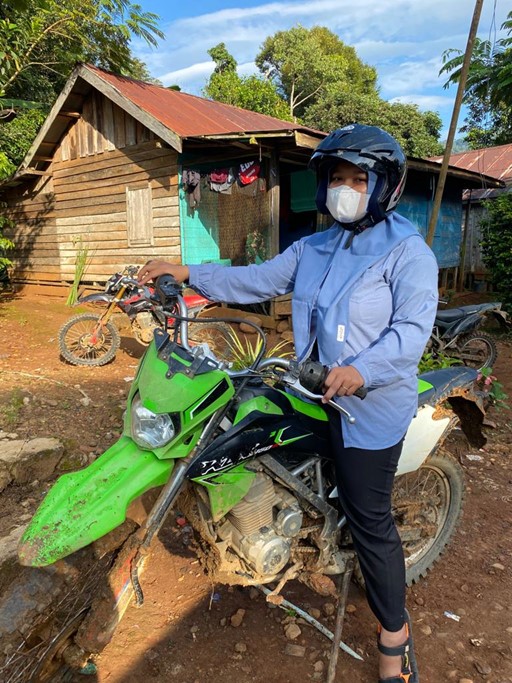Getting off her road bike, 31-year-old Eva Mismaya smiles brightly across the field of lemongrass to the people sitting on the porch of their wooden houses. Poised and contemplative from afar, Eva transforms when she speaks, showing her sharp and determined, yet warm and nurturing nature. That day, after riding 140 km from Batu Licin, Eva arrived in Batu Bulan to serve the community.
Apart from being a certified midwife, Eva is a village malaria worker (VMW) in the village of Gunungraya in Tanah Bumbu, South Kalimantan. Like in so many rural malaria endemic areas, health workers, including doctors and nurses, are somewhat lacking. This makes her role essential in the communities she serves.
Since 2015, Eva is responsible for various malaria activities such as mass blood surveys, epidemiological investigations, migration surveillance, and malaria screening in pregnant women and children. The community response was slow at first, but it improved as individuals were getting more aware of malaria and the importance of screening.
“I have been doing lots of adjustment since I was assigned to work here. The culture, the extreme environment, everything was harsh. The spirit from the community is what has kept me going all these years,” Eva said.

Eva and her off-road bike are ready to reach the most remote villages. Credit: WHO/Herdiana Hasan Basri
Community health workers like Eva are keenly aware of the health issues affecting their communities. Despite decreasing incidences, dengue and malaria remain the major health issues in Gunungraya village. Eva is among the population of Tanah Bumbu that became informants in WHO Indonesia’s malaria mapping study about mobile and migrant populations. Along with the Ministry of Health, WHO also supports malaria cadres of Penajem Paser Utara District in the neighbouring East Kalimantan Province.
Eva provides healthcare services to hundreds of people every month, reaching out to various locations where migrant workers gather. This group accounts for the majority of people living in Gunungraya, comprising of forest encroachers and gold panners. This population also brought the biggest challenge to Eva’s daily work, as they might come one day and disappear the day after, and some might return bringing malaria parasites. Eva believes that migration surveillance in the form of malaria blood screening in settlers and migrant workers is crucial in malaria prevention and control in this community.
“If we can screen for COVID-19 and make it mandatory for travellers, why can’t we do the same for malaria screening?” she said.
The local government has made arrangements to ease Eva’s work burden. She now has two colleagues working in the malaria community-based programme. Roads have been improved as well, making it much easier for Eva and her team to travel across the area.
Thanks to their hard work and resilience, the level of malaria testing in Gunungraya village has always been the highest in Tanah Bumbu District. However, Eva is not yet satisfied with the situation.
“I wish more cross-programmatic and sectoral support were provided to our community so that we can work even harder, making the community healthier,” she said.
WHO Indonesia’s malaria programme is generously supported by the Global Fund.
Written by Dr Ajib Diptyanusa, National Consultant for Malaria, and Dr Herdiana Hasan Basri, National Professional Officer for Malaria, WHO Indonesia
